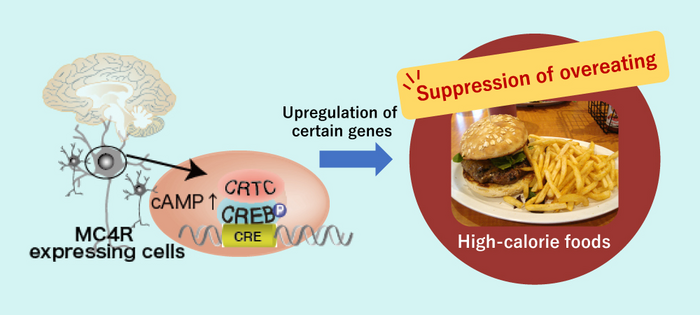High-calorie foods—high in fat, oil, and sugar—can taste good but often cause overeating, leading to obesity and major health problems. But what stimulates the brain to cause overeating?

Credit: Shigenobu Matsumura, Osaka Metropolitan University
High-calorie foods—high in fat, oil, and sugar—can taste good but often cause overeating, leading to obesity and major health problems. But what stimulates the brain to cause overeating?
Recently, it has become clear that a gene called CREB-Regulated Transcription Coactivator 1 (CRTC1) is associated with obesity in humans. When CRTC1 is deleted in mice, they become obese, indicating that functioning CRTC1 suppresses obesity. However, since CRTC1 is expressed in all neurons in the brain, the specific neurons responsible for suppressing obesity and the mechanism present in those neurons remained unknown.
To elucidate the mechanism by which CRTC1 suppresses obesity, a research group led by Associate Professor Shigenobu Matsumura from the Graduate School of Human Life and Ecology at Osaka Metropolitan University focused on neurons expressing the melanocortin-4 receptor (MC4R). They hypothesized that CRTC1 expression in MC4R-expressing neurons suppressed obesity because mutations in the MC4R gene are known to cause obesity. Consequently, they created a strain of mice that expresses CRTC1 normally except in MC4R-expressing neurons where it is blocked to examine the effect that losing CRTC1 in those neurons had on obesity and diabetes.
When fed a standard diet, the mice without CRTC1 in MC4R-expressing neurons showed no changes in body weight compared to control mice. However, when the CRTC1-deficient mice were raised on a high-fat diet, they overate, then became significantly more obese than the control mice and developed diabetes.
“This study has revealed the role that the CRTC1 gene plays in the brain, and part of the mechanism that stops us from overeating high-calorie, fatty, and sugary foods,” said Professor Matsumura. “We hope this will lead to a better understanding of what causes people to overeat.”
The research results were published in the FASEB Journal on November 9, 2022.
###
Osaka Metropolitan University is a new public university established by a merger between Osaka City University and Osaka Prefecture University in April 2022. For more science news, see https://www.omu.ac.jp/en/info/research-news/, and follow @OsakaMetUniv_en, or search #OMUScience.
Journal
The FASEB Journal
DOI
10.1096/fj.202200617R
Method of Research
Experimental study
Subject of Research
Animals
Article Title
CRTC1 deficiency, specifically in melanocortin-4 receptor-expressing cells, induces hyperphagia, obesity, and insulin resistance
Article Publication Date
9-Nov-2022




